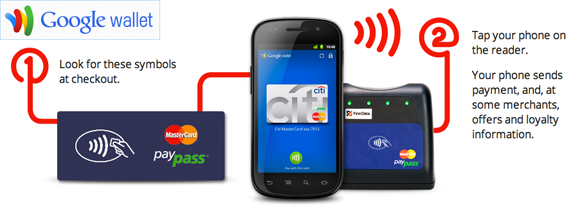Here’s what caught my attention in the payment space this week.
What’s in your mobile wallet?
MobileMarketingandTechnology.com (MMT) hosted a mobile payments conference in New York this week that brought together a diverse group of people from a few points along the value chain, including payment providers, credit card issuers, and consumer marketing services. With the mobile wallet at the center of the conversation, three questions recurred throughout the event:
- Who will control the mobile wallet?
- How do you get people to adopt it?
- What new features will a more intelligent wallet enable?
First, whose name will be on it? Google Wallet owns a tremendous amount of mind share given that virtually no one actually has it on their phone yet, and few people, even those in the conference’s crowd, have any idea when it will reach wider distribution. David Schropfer of the Luciano Group, author of “The Smartphone Wallet — Understanding the Disruption Ahead,” suggested that familiar brands will be key in helping consumers switch from a physical wallet to a digital one. “People don’t like to make two significant changes at once — how they pay and what they pay with.” If they’re switching from plastic cards to their mobile phones to make payments, consumers will almost certainly want a brand they trust with their money involved, someone like Visa or MasterCard. But while credit cards are trusted, those companies so far have had little success in promoting their own digital wallet solutions. They’re more likely to be an option on some other branded mobile wallet from Google, PayPal, Amazon, or even Isis.

The second key question on everyone’s mind was how to get people to use the services, whether that’s how to get them to notice and download an app, how to get them to favor the app, or how to get them to respond to things the app wants them to do. Google again appears highly favored, given the number of times every day the average person interacts with the brand’s services. PayPal or Amazon would seem to have a higher hurdle, given they have fewer touch points with consumers, but both have more than 100 million user accounts through which they could extend offers.
In terms of getting users to make transactions, it’s clear that the mobile wallet of the future will have a lot more “pull” to it, as opposed to the “push” nature of our physical wallets. I wrote recently about Placecast, which uses geofenced locations to trigger alerts when opted-in subscribers enter a particular zone. I was interested to hear from Placecast’s Blair Swedeen at the MMT conference that of the consumers who took action on offers, only 27% did so that day, with another 35% responding up to three days later — a longer shelf life than one might have expected for location-triggered offers.
Opinions differed as to whether or not mobile payments would replace cash. Tom Meredith of P2PCash suggested it wouldn’t replace simple cash transactions, and Schropfer showed data indicating that while debit card usage had replace plenty of credit card usage, cash purchases remained fairly steady in the US. The story may be different in other countries. Schropfer also presented a slide showing a dramatic rise in the volume of Safaricom’s M-PESA text-message payments in Kenya from 2007-2010, while cash usage in the country dwindled significantly. This suggests that the M-PESA payments have indeed replaced cash payments when available for small, simple transactions like taxis and bus rides.
There is no shortage of answers to the third question — what features will a more intelligent wallet enable? Certainly, those features will include the ability to set limits on payments (where and how much), better ways to prevent fraud (since phones offer a variety of ways to confirm identity), and obvious marketing tools like location-smart marketing and automated rewards and loyalty programs. Schropfer suggested another feature: retailers steering customers to their preferred method of accepting payment. In the physical world, retailers are pretty much at the mercy of consumers’ payment options. But in a smart-wallet purchase, merchants will have a greater ability to dynamically offer discounts based on a consumer’s choice of payment. A company might offer a bigger discount if you pay with, for example, PayPal, if the merchant can redistribute that value within the PayPal system without paying any fees. The retailer might offer a smaller discount with Visa and none at all with American Express since those options cost the merchant more. And, of course, those conditions might vary from day to day as different payment providers offer different incentives.
In short, there will be far more options and capabilities with a mobile wallet. But it also seems clear that, as often happens, a technology that enters the scene promising to make life simpler winds up making it more complicated.
Pew survey: One quarter of US adults use location services
About a quarter of Americans use the location-smart capabilities of their mobile phones to get directions or recommendations; far fewer use them to share where they are with friends and contacts. That’s one conclusion from a Pew Research Center survey based on phone interviews with 2,277 U.S. adults last spring. The percentages are higher for smart phone owners. Only 4% owned up to checking in on services like Foursquare or Gowalla, while a slightly higher number had set up their social media services (Facebook, LinkedIn, Twitter) to show their locations when posting. (I have to wonder if that number has jumped higher since Facebook changed its posting settings to make location-aware posts easier.) The Knight Digital Media Center for digital journalism picked up on the Pew results to urge news media publishers to geotag their content.
Got news?
News tips and suggestions are always welcome, so please send them along.
If you’re interested in learning more about the payment development space, check out PayPal X DevZone, a collaboration between O’Reilly and PayPal.
Related:
